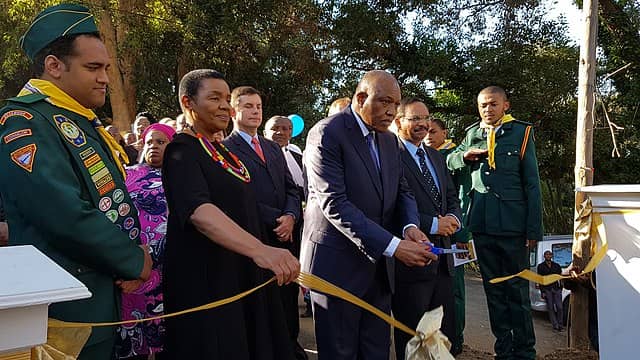In Africa, names given to babies usually have unique stories behind them. From the time or day a baby is born to the circumstances surrounding the birth, many factors influence the names African parents choose for their kids.
The naming ceremony of a newborn baby is among the most essential rights in Africa. It’s a beautiful celebration where the new baby gets their very own name, surrounded by the warmth and love of the community. Read on to uncover the richness of African naming ceremonies.
Become an insider. Subscribe to our newsletter for more top trending stories like this!
Join our Spotcovery Global Black Community Facebook Group for early access to exclusive content and to share in a lively discussion.
Cultural Significance of Africa Naming Ceremonies
In African culture, a name isn’t just a bunch of letters. It has a meaning embedded into it. Each name carries a message that’s as old as the hills and fresh as the morning sun.
Names tell stories about where a family comes from, the battles they’ve fought, and the dreams and cultural values they hold dear. A baby’s name is like a bridge that connects the past and the future.
When a baby is born, the community celebrates and bestows a name that holds generations of stories. In some African countries, like Nigeria, this ceremony takes seven days after the child is born. During the event, a priest or a custodian of the family ancestral oracle will be available to preside over the ceremony.
This is when the infant is officially presented to the family members and given their names. It’s a way of saying publicly, “Hey, little one, you’re not just starting a new chapter – you’re adding your unique colors to a canvas that’s been painted by generations before you.”
But it’s not just about the past but also the future. Names are similar to seeds planted in the soil of time, growing into something strong and beautiful. When a child hears their name, they’re not just hearing a sound – they’re hearing the echoes of their ancestors and the hopes of the people who love them.
Additionally, African naming ceremonies aren’t just about names; they’re about unity, respect, and the deep connection between individuals and their roots. They carry the essence of family values and the power of shared experiences. To learn more about Africa culture get a book from Amazon.
People Also Read: Unraveling the Tradition of Money Throwing at African Weddings
Joyous Celebration
A naming ceremony is a party that celebrates the arrival of a new life and the bonds that tie us all together. Picture a big gathering under the open sky, where families, friends, and even neighbors come to dance, sing, and share in the happiness.
As the beat of the drums sets the rhythm, the whole place comes alive with color and movement. People sway to melodies that seem to flow straight from the heart. And amid it all, there’s a baby – the star of the show – embraced by the love and laughter of everyone around.
African naming ceremonies remind us that life is a shared journey and welcoming a new soul is a collective endeavor. These ceremonies unite families, friends, and communities, strengthening and connecting them.
Become an insider. Subscribe to our newsletter for more top trending stories like this!
People Also Read: 10 Interesting African Attires That Represent the Face of Africa
Diversity in African Naming Ceremonies
Africa isn’t just one big puzzle piece; it’s a mosaic of cultures, languages, and customs. So, it’s no surprise that Naming Ceremonies aren’t the same everywhere. Each community adds its brushstroke to the canvas, creating a masterpiece of variety.
If you travel to different parts of Africa, you’ll discover that every naming ceremony has its style, music, and rituals. From the rhythmic beats of drums in one place to the delicious traditional foods and drinks in another, these ceremonies mirror the rich landscapes they come from.
But despite the differences, there’s a common thread – the celebration of life and the passage of tradition. African naming ceremonies teach us that even though we have unique stories, we’re all part of the same incredible human story.
African naming ceremonies aren’t just about names; they’re about unity, respect, and the deep connection between individuals and their roots. They carry the essence of family values and the power of shared experiences.
So, if you ever find yourself at an African naming ceremony, let the joy sweep you up. Dance to the rhythm of unity, smile at the bonds that tie us, and celebrate the beauty of life, love, and togetherness.
People Also Read: Easter in Africa – The Best Easter Traditions in Africa
Nearly 80% of consumers visit directories with reviews to find a local business. List your business for free in our exclusive Spotcovery Black-Owned Business Directory.
Spotcovery offers unique and fresh daily content on Black culture, lifestyle, and experiences. We talk about everything black, black people, black-owned and black-owned businesses. We also deliver authentic and relevant content that will inform, inspire and empower you! The future of black media is critical to today’s black experience! Our primary audience includes African American, African, Afro-Caribbean, and people of African heritage. Black culture is for the culture!
Become an insider. Subscribe to our newsletter for more top trending stories like this!





